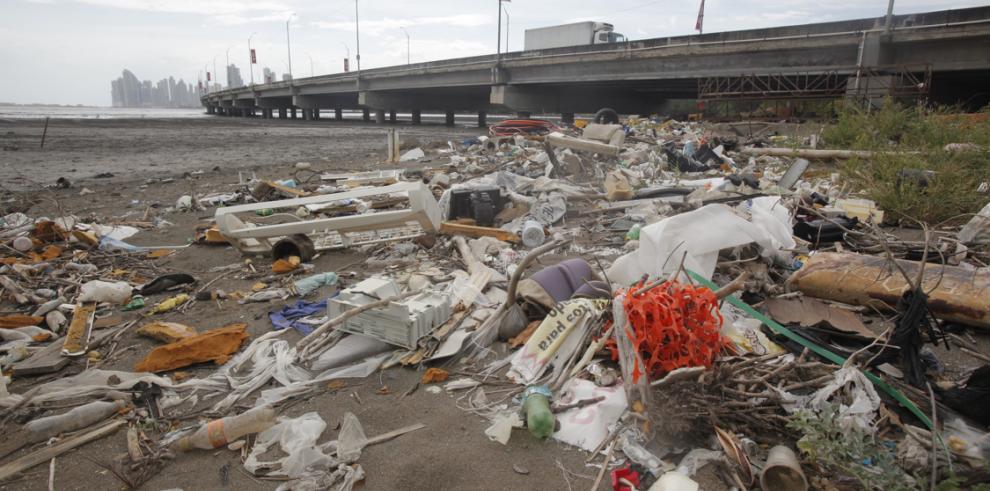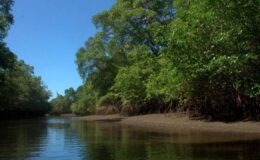Plastic reduction calls for action and less meetings. This is old topic getting worse.
- By : James Bryson
- Category : Conservation, Environmental, Panama Tourism

The one thing all of the retirement destinations have in common, is the massive shithole that shows itself as plastic all over the shores. I have seen it in Panama, Costa Rica and Mexico.
The oceans have become huge sinks for plastic waste. The recycling panacea was a mirage. Contamination by persistent resins is a complex problem that requires coordinated global solutions, the MarViva Latin American foundation explains to Efe.
“The discussion of a new international treaty on plastic pollution that covers the entire globe is urgent, because the dynamics of the problem is global and, therefore, the solutions have to be global and coordinated at different levels,” says Alberto Quesada, coordinator regional MarViva marine pollution.
The management of plastic waste is one of the main topics of the fifth session of the UN Environmental Assembly (UNEA 5), which begins on the 28th in Nairobi (Kenya).
The European Commissioner for the Environment, Oceans and Fisheries, Virginijus Sinkevicius, assured weeks ago that there are already 140 countries in favor of global regulation of the treatment of plastic waste, half of them willing to support binding measures.
Because one thing is the principles, which arouse great support, and another the details, where discrepancies arise, admits the senior official.
The expectations of environmentalists are clear. “We hope that at UNEA 5 the countries will issue a resolution based on the proposal by Peru and Rwanda to form an Intergovernmental Negotiating Committee with the mandate to negotiate a new international treaty on plastic pollution in two years (…) if it goes to be binding or not, that is under discussion,” stresses the MarViva spokesperson.
This non-governmental organization -created in 2002 and with a presence in Panama, Costa Rica and Colombia- promotes responsible dynamics for marine products and services and works to strengthen institutional capacities to optimize sustainable management of the sea.
The NGO has contributed to the coordination of the Action Plan on Marine Litter for the Northeast Pacific, which covers Panama, Costa Rica, Guatemala, El Salvador, Honduras, Nicaragua, Colombia and Mexico.
THE EMERGENCY DUE TO PLASTICS POLLUTION
According to recent data, there are some 200 million tons of plastic waste in marine spaces, a figure that will triple by 2040 if there is not “a major paradigm shift,” Quesada warns.
The World Wide Fund for Nature (WWF, for its acronym in English) has warned in a recent report that plastic pollution has reached “every corner of the oceans” and its mass is such that, even if the discharge ceased, the volume of micro and nanoplastics would double by 2050.
“Any study of fish products reveals that they contain plastic. Human beings are ingesting plastic particles, many of them from marine debris,” warns the MarViva expert, who also recalls that food chains – the feeding of herds – are supplied from the sea.
In fact, 88% of marine species are affected by plastic pollution and many of them -including those for human consumption- have these materials in their bodies, indicates WWF.
The impact on health is still unknown, but it is believed that “in the long term it can be very harmful,” WWF’s director for global plastic policy, Eirik Lindebjerg, recently told Efe in Geneva.
Plastic also prevents the seabed from acting as a sink for greenhouse gases, a task similar to that carried out by trees.
“The balancing function of the climate, of regulating the Earth’s temperature thanks to the ocean, is tremendous. Part of the fight against climate change has to do with recovering its health,” says Quesada.
Beyond the environmental, the impact of plastic waste “seriously affects the economy of fishing communities,” warns the WWF report, which emphasizes that the irreversible pollution of the oceans requires a global and coordinated response.
THE FIGHT AGAINST THE PLASTIC MONSTER
This situation requires persevering in achieving “a treaty to reduce the production of unnecessary plastics and non-recyclable plastics,” emphasizes the MarViva member.
“A framework agreement would establish the obligation to reduce national production of specific plastics. The time and way in which each country advances is something that each one would define and that is a good solution,” says the Latin American environmental organization, which calls for a model similar to that of national contributions for the reduction of greenhouse gases.
Because until now, most initiatives to combat plastic pollution have been voluntary, and have had recovery and recycling as their main strategy, hence their failure.
“Recycling plastics is not technically easy, it is quite expensive and many are not even recyclable,” says this activist, who asserts that “voluntary initiatives promoted by companies have not been effective or efficient”
A study published in 2017 indicated that only 9% of the plastic ever made has been recycled, about 12% has been burned, and the rest has been thrown into landfills.
“Recycling is important, but not enough. A comprehensive vision is required, reducing unnecessary and non-recyclable production. Large investments are needed for innovation and the design of new products and materials. We have the opportunity to replace up to 27% of what is produced today,” emphasizes Quesada.



No Comments